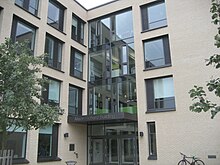Centre for Research in the Arts, Social Sciences and Humanities
hideThis article has multiple issues. Please help or discuss these issues on the talk page. (Learn how and when to remove these template messages)
|
 Alison Richard Building, Sidgwick Site, University of Cambridge | |
| Established | 2001 |
|---|---|
| Director | Steven Connor |
| Location | Alison Richard Building, 7 West Road, Cambridge , United Kingdom |
| Campus | Sidgwick Site, Cambridge |
| Affiliations | University of Cambridge |
| Website | www |
The Centre for Research in the Arts, Social Sciences and Humanities (CRASSH) is an interdisciplinary research centre within the University of Cambridge. Founded in 2001, CRASSH came into being as a way to create interdisciplinary dialogue across the University’s many faculties and departments in the arts, social sciences, and humanities, as well as to build bridges with scientific subjects. It has now grown into one of the largest humanities institutes in the world and is a major presence in academic life in the UK. It serves at once to draw together disciplinary perspectives in Cambridge and to disseminate new ideas to audiences across Europe and beyond.
CRASSH’s mission is to create new resources for thought, stimulate interdisciplinary research and disciplinary innovation, establish new intellectual networks and affiliations, respond to emerging social and political challenges, engage new publics in humanities research and help to shape public policy. Its programmes include visiting fellowships, early career fellowships for Cambridge academics, and a variety of interdisciplinary research networks, alongside a conference programme designed to forge new connections and open up fresh intellectual pathways. CRASSH’s research community includes many postdoctoral researchers working on its diverse range of interdisciplinary projects, which often involve international collaborations, and are funded by research councils, charities, trusts, and philanthropic donations.
Directors[]
- Ian Donaldson, 2001–3
- Ludmilla Jordanova, 2003–5
- Mary Jacobus, 2005–11
- Andrew Webber (Sabbatical Director), 2009–10
- Simon Goldhill, 2011–18
- Steven Connor, 2018–
Management committee 2019[]
- Committee Chair: Sarah Franklin (Professor of Sociology)
- CRASSH Director: Steven Connor FBA (Grace 2 Professor of English)
- CRASSH Deputy-Director: Jan-Melissa Schramm (University Lecturer in Nineteenth-Century Literature, Faculty of English)
- Phil Allmendinger (Chair, School of Humanities and Social Sciences)
- Melissa Calaresu (Neil McKendrick Lecturer in History, Faculty of History)
- Bridget Kendall (Master of Peterhouse)
- Alison Liebling (Professor of Criminology and Criminal Justice)
- Caroline van Eck (Professor of Art History)
- Andrew Webber (Professor of Modern German and Comparative Culture, Department of German)
- Chris Young (Chair, School of Arts and Humanities)
Research projects[]
CRASSH is home to numerous major, long-term research projects.[1]
As of May 2019, centres within CRASSH include:
- Centre for Global Knowledge Studies
- Centre for the Humanities and Social Change, Cambridge
- Centre for the Study of Existential Risk
As of May 2019, projects include:
- Beyond the Cold War: Toward a Community of Asia
- Crossroads of Knowledge in Early Modern England: The Place of Literature
- Expertise Under Pressure
- Genius Before Romanticism: Ingenuity in Early Modern Art and Science
- Giving Voice to Digital Democracies: The Social Impact of Artificially Intelligent Communications Technology
- The Global as ARTEFACT: Understanding the Patterns of Global Political History Through an Anthropology of Knowledge – The Case of Agriculture in Four Global Systems from the Neolithic to the Present
- Making Visible: The Visual and Graphic Practices of the Early Royal Society
- Qualitative and Quantitative Social Science: Unifying the Logic of Causal Inference?
- Religious Diversity and the Secular University
Research networks[]
The CRASSH Research Networks Programme[2] supports groups of Cambridge graduate students and faculty members working together with a common interdisciplinary research interest, bringing together early-career researchers, established academics and guest speakers on particular research topics for a year of collaborative work.
Conferences[]
The CRASSH Conference Programme][3] showcases arts, social sciences and humanities research in action. It enables Cambridge scholars to convene events designed to look beyond disciplinary boundaries and broker exciting collaborations with academics and practitioners from across the world.
Fellowships[]
CRASSH offers a number of Fellowship Programmes[4] to bring scholars from all over the world to Cambridge. These schemes allow a community of scholars–from postdoctoral and early career researchers to more established visiting fellows–to interact in an interdisciplinary research environment.
Alison Richard Building[]
At the beginning of 2012, CRASSH moved into the new Alison Richard Building at the West Road gateway to the University’s Sidgwick Site, the main base for humanities and social science teaching and research at Cambridge. The building was designed by Nicholas Hare Architects and received a commendation at the 2013 Civic Trust Awards. The Centre’s relocation put CRASSH alongside the major regional studies centres as well as the Department of Politics and International Studies. The building is also home to Edmund de Waal's first piece of public sculpture, A Local History, a commission of three vitrines filled with porcelain and sunk into the pavement outside the building.
See also[]
References[]
- ^ "Projects". CRASSH. Retrieved 10 May 2020.
- ^ "Research Networks". CRASSH. Retrieved 10 May 2020.
- ^ "Conferences". CRASSH. Retrieved 10 May 2020.
- ^ "Fellowships". CRASSH. Retrieved 10 May 2020.
External links[]
- Culture of the University of Cambridge
- History of literature
- Educational projects
- Research projects
- Institutions in the School of Arts and Humanities, University of Cambridge
- Research institutes in Cambridge
- Social science institutes
- Research institutes established in 2001
- 2001 establishments in England

